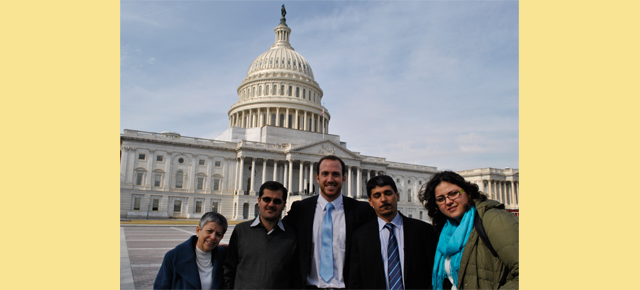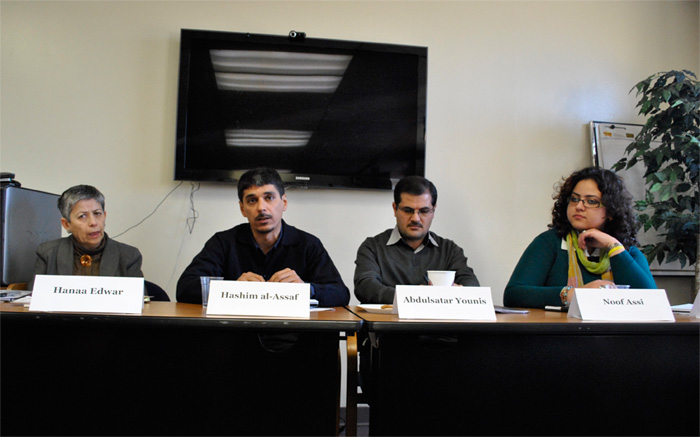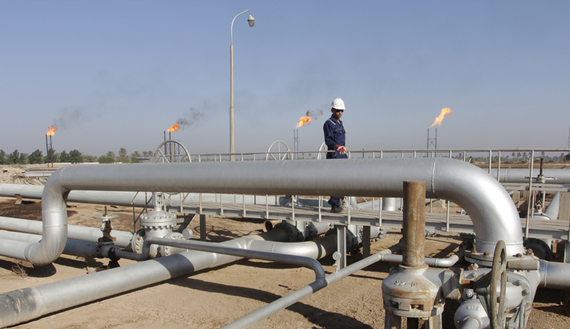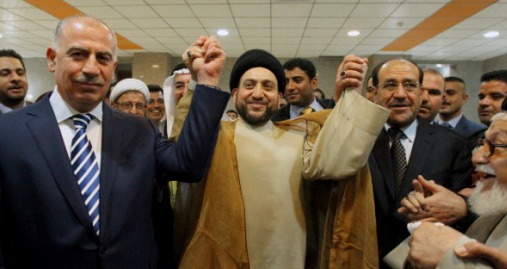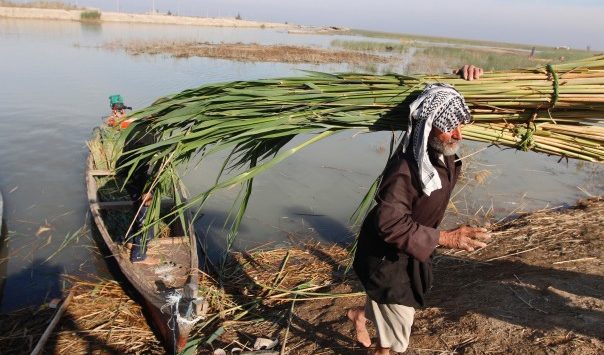Iraqi Civil Society Activists Bring Their Vision to Washington, D.C.
Iraqi Civil Society Activists Bring Their Vision to Washington, D.C.
Four exceptional human and women’s rights, youth and nonviolence activists from Iraq met with U.S. government officials, representatives of U.S. NGOs, as well as American peace and justice activists during the week of February 5 to 11. In presentations to a wide range of audiences around the nation’s capital, the two women and two men shared vitally important stories about the achievements of Iraqi civil society since 2003. At the same time they were highly critical of the government that the U.S. left in place in Iraq and they warned that activists face great obstacles: their basic rights of freedom of expression and freedom to protest are not protected. Many have been jailed for their peaceful opposition to current policies. Some like the journalist and human rights advocate, Hadi al-Mahdi, have paid with their lives.
Hanaa Edwar, the secretary general of one of Iraq’s largest and oldest NGO’s, the Iraqi Al-Amal (which means “Hope”) Association described Iraq today as a “stateless state.” From her 40 years experience as a human rights, women’s rights, and democracy activist, Ms. Edwar described the political system that the U.S. created, where representation is based on Sunni, Shia and Kurdish identity, as simply terrible. “There is no sense that the state belongs to ALL Iraqis. Each minister serves only his own group.”
This is a devastating problem, Edwar emphasized, in a nation where security is extremely fragile. Iraq has endured sanctions, followed by war, followed by chaos. Iraq is a nation rich in resources, but today 23% live in poverty. In the 1970s, UNESCO recognized Iraq for universal literacy, today 45% cannot read and write. Youth face a 40% unemployment rate. Complicating any effort to address these problems, Iraq is the fourth most corrupt state in the world.
Amid this dismal reality, civil society is Iraq’s great hope. Hashim al-Assaf, who heads the Iraq office of the NGOs Coordination Committee for Iraq [NCCI], the main umbrella organization for NGOs working in the country, described how civil society organizations provided for people’s basic needs during the early years of the U.S. invasion and occupation. He recalled how in 2003 Iraqi civil society was still “a weak baby” after years of repression under Saddam Hussein. NGOs had no legal status and citizens needed to learn how to demand their rights. Edwar agreed, “2003 was a moment when Iraqi NGOs needed to overcome the long isolation of 1991 to 2002. Now we have solidarity. Working together, we offer an alternative to the politicians’ vision of division by ethnicity and race.”
Today, Mr. al-Assaf is able to point to significant gains. Civil society activists fought for and won passage of an NGO law that is the best in the Middle East. They brought a major lawsuit in the Iraqi federal court for the “civic defense of the constitution” that forced members of Parliament to form a government in 2010. Women won 25% representation in Parliament. Candidates for the new High Commission of Human Rights in Iraq will be selected with significant participation of civil society.
Many peace-building efforts launched by civil society organizations promote dialogue among different ethnic and religious groups. And recently, in a pointed rejection of the politicized sectarianism of the current government, dozens of organizations joined together to call for 2012 to be a “Year of Civic Peace.”
One person who is totally committed to spreading a culture of peace, is Ms. Noof Assi, a youth activist and blogger, who last year participated in and reported on the Arab Uprisings in Baghdad. The Arab Spring gave youth courage, Assi explained, “our goal was not to overthrow the government, but to demand services. I grew up with no idea that you could criticize the government. Now that has changed.” On Valentines Day 2011, hundreds of protesters marched in Baghdad’s Freedom Square carrying signs that read “We Love Iraq.” That love motivates Assi to learn how to be more effective in putting pressure on the government and how to teach other youth to be activists, to use the law, to express their opinions, and exercise their rights.
Abdulsattar Younis, coordinator of the Iraqi Kurdistan NGOs Network [IKNN], the umbrella network established to support Kurdish and Arab NGOs registered with the Kurdish Regional Government [KRG], described similar trends in the north of Iraq where a new NGO law was passed just six months ago. Now people are working on issues, most importantly promoting free expression and a free press, working to monitor the government and end corruption, and to stop violence against women. While the KRG has been separate from the Iraqi government since 1991, Mr. Younis stressed that many civil society organizations, such as the La’Onf nonviolence network, are nationwide and provide a strong counterforce to the ethnic and sectarian strife that the present political system promotes.
Challenges persist. Politicians are suspicious of civil society institutions. Independent trade unions and independent media are constantly attacked. Many restrictive laws from the Saddam era are still on the books; new laws drafted by Parliament concerning the freedom of expression and the press violate international human rights law. Security remains elusive.
The Iraqis did not hesitate to blame many of these current difficulties on the way the U.S. occupation forces constructed Iraq’s government, especially Article 41 of the constitution that divides people by religions and ethnicity. Edwar also pointed to the absolute lack of accountability for war crimes and human rights violations perpetrated by the U.S. military and its employees. “We are waiting for justice!” she warned. Until there is true justice, Edwar saw little possibility for Iraqis trusting the U.S.
Moreover, Edwar advised that U.S. peace and justice activists should be seriously questioning their own government. “The U.S. spent $400 billion in Iraq! Where is it?” she asked. Edwar described how the U.S. built prisons and detention centers, supported the Iraqi military, and the oil industry, but couldn’t restore electricity and water, or construct schools and hospitals. “It went to government structure, not to the people.” She believes that now is the time for Americans, both inside and outside the government, to build cultural and human relations with Iraqis, and to create educational exchange programs, as one of many ways of supporting Iraqi civil society.
As more Iraqis understand the concepts of activism and volunteerism, as they develop leadership skills and expand the sectors in which civil society plays a role Iraqi citizens will have ever-greater opportunities to shape Iraqi society. Noof Assi, is sure of that. “We are not hopeless,” she says, “two weeks from now we are going back to Freedom Square!”
Iraqi Civil Society Activists Bring Their Vision to Washington, D.C.
Four exceptional human and women’s rights, youth and nonviolence activists from Iraq met with U.S. government officials, representatives of U.S. NGOs, as well as American peace and justice activists during the week of February 5 to 11. In presentations to a wide range of audiences around the nation’s capital, the two women and two men shared vitally important stories about the achievements of Iraqi civil society since 2003. At the same time they were highly critical of the government that the U.S. left in place in Iraq and they warned that activists face great obstacles: their basic rights of freedom of expression and freedom to protest are not protected. Many have been jailed for their peaceful opposition to current policies. Some like the journalist and human rights advocate, Hadi al-Mahdi, have paid with their lives.
Hanaa Edwar, the secretary general of one of Iraq’s largest and oldest NGO’s, the Iraqi Al-Amal (which means “Hope”) Association described Iraq today as a “stateless state.” From her 40 years experience as a human rights, women’s rights, and democracy activist, Ms. Edwar described the political system that the U.S. created, where representation is based on Sunni, Shia and Kurdish identity, as simply terrible. “There is no sense that the state belongs to ALL Iraqis. Each minister serves only his own group.”
This is a devastating problem, Edwar emphasized, in a nation where security is extremely fragile. Iraq has endured sanctions, followed by war, followed by chaos. Iraq is a nation rich in resources, but today 23% live in poverty. In the 1970s, UNESCO recognized Iraq for universal literacy, today 45% cannot read and write. Youth face a 40% unemployment rate. Complicating any effort to address these problems, Iraq is the fourth most corrupt state in the world.
Amid this dismal reality, civil society is Iraq’s great hope. Hashim al-Assaf, who heads the Iraq office of the NGOs Coordination Committee for Iraq [NCCI], the main umbrella organization for NGOs working in the country, described how civil society organizations provided for people’s basic needs during the early years of the U.S. invasion and occupation. He recalled how in 2003 Iraqi civil society was still “a weak baby” after years of repression under Saddam Hussein. NGOs had no legal status and citizens needed to learn how to demand their rights. Edwar agreed, “2003 was a moment when Iraqi NGOs needed to overcome the long isolation of 1991 to 2002. Now we have solidarity. Working together, we offer an alternative to the politicians’ vision of division by ethnicity and race.”
Today, Mr. al-Assaf is able to point to significant gains. Civil society activists fought for and won passage of an NGO law that is the best in the Middle East. They brought a major lawsuit in the Iraqi federal court for the “civic defense of the constitution” that forced members of Parliament to form a government in 2010. Women won 25% representation in Parliament. Candidates for the new High Commission of Human Rights in Iraq will be selected with significant participation of civil society.
Many peace-building efforts launched by civil society organizations promote dialogue among different ethnic and religious groups. And recently, in a pointed rejection of the politicized sectarianism of the current government, dozens of organizations joined together to call for 2012 to be a “Year of Civic Peace.”
One person who is totally committed to spreading a culture of peace, is Ms. Noof Assi, a youth activist and blogger, who last year participated in and reported on the Arab Uprisings in Baghdad. The Arab Spring gave youth courage, Assi explained, “our goal was not to overthrow the government, but to demand services. I grew up with no idea that you could criticize the government. Now that has changed.” On Valentines Day 2011, hundreds of protesters marched in Baghdad’s Freedom Square carrying signs that read “We Love Iraq.” That love motivates Assi to learn how to be more effective in putting pressure on the government and how to teach other youth to be activists, to use the law, to express their opinions, and exercise their rights.
Abdulsattar Younis, coordinator of the Iraqi Kurdistan NGOs Network [IKNN], the umbrella network established to support Kurdish and Arab NGOs registered with the Kurdish Regional Government [KRG], described similar trends in the north of Iraq where a new NGO law was passed just six months ago. Now people are working on issues, most importantly promoting free expression and a free press, working to monitor the government and end corruption, and to stop violence against women. While the KRG has been separate from the Iraqi government since 1991, Mr. Younis stressed that many civil society organizations, such as the La’Onf nonviolence network, are nationwide and provide a strong counterforce to the ethnic and sectarian strife that the present political system promotes.
Challenges persist. Politicians are suspicious of civil society institutions. Independent trade unions and independent media are constantly attacked. Many restrictive laws from the Saddam era are still on the books; new laws drafted by Parliament concerning the freedom of expression and the press violate international human rights law. Security remains elusive.
The Iraqis did not hesitate to blame many of these current difficulties on the way the U.S. occupation forces constructed Iraq’s government, especially Article 41 of the constitution that divides people by religions and ethnicity. Edwar also pointed to the absolute lack of accountability for war crimes and human rights violations perpetrated by the U.S. military and its employees. “We are waiting for justice!” she warned. Until there is true justice, Edwar saw little possibility for Iraqis trusting the U.S.
Moreover, Edwar advised that U.S. peace and justice activists should be seriously questioning their own government. “The U.S. spent $400 billion in Iraq! Where is it?” she asked. Edwar described how the U.S. built prisons and detention centers, supported the Iraqi military, and the oil industry, but couldn’t restore electricity and water, or construct schools and hospitals. “It went to government structure, not to the people.” She believes that now is the time for Americans, both inside and outside the government, to build cultural and human relations with Iraqis, and to create educational exchange programs, as one of many ways of supporting Iraqi civil society.
As more Iraqis understand the concepts of activism and volunteerism, as they develop leadership skills and expand the sectors in which civil society plays a role Iraqi citizens will have ever-greater opportunities to shape Iraqi society. Noof Assi, is sure of that. “We are not hopeless,” she says, “two weeks from now we are going back to Freedom Square!”
Iraqi Civil Society Activists Bring Their Vision to Washington, D.C.
Four exceptional human and women’s rights, youth and nonviolence activists from Iraq met with U.S. government officials, representatives of U.S. NGOs, as well as American peace and justice activists during the week of February 5 to 11. In presentations to a wide range of audiences around the nation’s capital, the two women and two men shared vitally important stories about the achievements of Iraqi civil society since 2003. At the same time they were highly critical of the government that the U.S. left in place in Iraq and they warned that activists face great obstacles: their basic rights of freedom of expression and freedom to protest are not protected. Many have been jailed for their peaceful opposition to current policies. Some like the journalist and human rights advocate, Hadi al-Mahdi, have paid with their lives.
Hanaa Edwar, the secretary general of one of Iraq’s largest and oldest NGO’s, the Iraqi Al-Amal (which means “Hope”) Association described Iraq today as a “stateless state.” From her 40 years experience as a human rights, women’s rights, and democracy activist, Ms. Edwar described the political system that the U.S. created, where representation is based on Sunni, Shia and Kurdish identity, as simply terrible. “There is no sense that the state belongs to ALL Iraqis. Each minister serves only his own group.”
This is a devastating problem, Edwar emphasized, in a nation where security is extremely fragile. Iraq has endured sanctions, followed by war, followed by chaos. Iraq is a nation rich in resources, but today 23% live in poverty. In the 1970s, UNESCO recognized Iraq for universal literacy, today 45% cannot read and write. Youth face a 40% unemployment rate. Complicating any effort to address these problems, Iraq is the fourth most corrupt state in the world.
Amid this dismal reality, civil society is Iraq’s great hope. Hashim al-Assaf, who heads the Iraq office of the NGOs Coordination Committee for Iraq [NCCI], the main umbrella organization for NGOs working in the country, described how civil society organizations provided for people’s basic needs during the early years of the U.S. invasion and occupation. He recalled how in 2003 Iraqi civil society was still “a weak baby” after years of repression under Saddam Hussein. NGOs had no legal status and citizens needed to learn how to demand their rights. Edwar agreed, “2003 was a moment when Iraqi NGOs needed to overcome the long isolation of 1991 to 2002. Now we have solidarity. Working together, we offer an alternative to the politicians’ vision of division by ethnicity and race.”
Today, Mr. al-Assaf is able to point to significant gains. Civil society activists fought for and won passage of an NGO law that is the best in the Middle East. They brought a major lawsuit in the Iraqi federal court for the “civic defense of the constitution” that forced members of Parliament to form a government in 2010. Women won 25% representation in Parliament. Candidates for the new High Commission of Human Rights in Iraq will be selected with significant participation of civil society.
Many peace-building efforts launched by civil society organizations promote dialogue among different ethnic and religious groups. And recently, in a pointed rejection of the politicized sectarianism of the current government, dozens of organizations joined together to call for 2012 to be a “Year of Civic Peace.”
One person who is totally committed to spreading a culture of peace, is Ms. Noof Assi, a youth activist and blogger, who last year participated in and reported on the Arab Uprisings in Baghdad. The Arab Spring gave youth courage, Assi explained, “our goal was not to overthrow the government, but to demand services. I grew up with no idea that you could criticize the government. Now that has changed.” On Valentines Day 2011, hundreds of protesters marched in Baghdad’s Freedom Square carrying signs that read “We Love Iraq.” That love motivates Assi to learn how to be more effective in putting pressure on the government and how to teach other youth to be activists, to use the law, to express their opinions, and exercise their rights.
Abdulsattar Younis, coordinator of the Iraqi Kurdistan NGOs Network [IKNN], the umbrella network established to support Kurdish and Arab NGOs registered with the Kurdish Regional Government [KRG], described similar trends in the north of Iraq where a new NGO law was passed just six months ago. Now people are working on issues, most importantly promoting free expression and a free press, working to monitor the government and end corruption, and to stop violence against women. While the KRG has been separate from the Iraqi government since 1991, Mr. Younis stressed that many civil society organizations, such as the La’Onf nonviolence network, are nationwide and provide a strong counterforce to the ethnic and sectarian strife that the present political system promotes.
Challenges persist. Politicians are suspicious of civil society institutions. Independent trade unions and independent media are constantly attacked. Many restrictive laws from the Saddam era are still on the books; new laws drafted by Parliament concerning the freedom of expression and the press violate international human rights law. Security remains elusive.
The Iraqis did not hesitate to blame many of these current difficulties on the way the U.S. occupation forces constructed Iraq’s government, especially Article 41 of the constitution that divides people by religions and ethnicity. Edwar also pointed to the absolute lack of accountability for war crimes and human rights violations perpetrated by the U.S. military and its employees. “We are waiting for justice!” she warned. Until there is true justice, Edwar saw little possibility for Iraqis trusting the U.S.
Moreover, Edwar advised that U.S. peace and justice activists should be seriously questioning their own government. “The U.S. spent $400 billion in Iraq! Where is it?” she asked. Edwar described how the U.S. built prisons and detention centers, supported the Iraqi military, and the oil industry, but couldn’t restore electricity and water, or construct schools and hospitals. “It went to government structure, not to the people.” She believes that now is the time for Americans, both inside and outside the government, to build cultural and human relations with Iraqis, and to create educational exchange programs, as one of many ways of supporting Iraqi civil society.
As more Iraqis understand the concepts of activism and volunteerism, as they develop leadership skills and expand the sectors in which civil society plays a role Iraqi citizens will have ever-greater opportunities to shape Iraqi society. Noof Assi, is sure of that. “We are not hopeless,” she says, “two weeks from now we are going back to Freedom Square!”
Iraqi Civil Society Activists Bring Their Vision to Washington, D.C.
Four exceptional human and women’s rights, youth and nonviolence activists from Iraq met with U.S. government officials, representatives of U.S. NGOs, as well as American peace and justice activists during the week of February 5 to 11. In presentations to a wide range of audiences around the nation’s capital, the two women and two men shared vitally important stories about the achievements of Iraqi civil society since 2003. At the same time they were highly critical of the government that the U.S. left in place in Iraq and they warned that activists face great obstacles: their basic rights of freedom of expression and freedom to protest are not protected. Many have been jailed for their peaceful opposition to current policies. Some like the journalist and human rights advocate, Hadi al-Mahdi, have paid with their lives.
Hanaa Edwar, the secretary general of one of Iraq’s largest and oldest NGO’s, the Iraqi Al-Amal (which means “Hope”) Association described Iraq today as a “stateless state.” From her 40 years experience as a human rights, women’s rights, and democracy activist, Ms. Edwar described the political system that the U.S. created, where representation is based on Sunni, Shia and Kurdish identity, as simply terrible. “There is no sense that the state belongs to ALL Iraqis. Each minister serves only his own group.”
This is a devastating problem, Edwar emphasized, in a nation where security is extremely fragile. Iraq has endured sanctions, followed by war, followed by chaos. Iraq is a nation rich in resources, but today 23% live in poverty. In the 1970s, UNESCO recognized Iraq for universal literacy, today 45% cannot read and write. Youth face a 40% unemployment rate. Complicating any effort to address these problems, Iraq is the fourth most corrupt state in the world.
Amid this dismal reality, civil society is Iraq’s great hope. Hashim al-Assaf, who heads the Iraq office of the NGOs Coordination Committee for Iraq [NCCI], the main umbrella organization for NGOs working in the country, described how civil society organizations provided for people’s basic needs during the early years of the U.S. invasion and occupation. He recalled how in 2003 Iraqi civil society was still “a weak baby” after years of repression under Saddam Hussein. NGOs had no legal status and citizens needed to learn how to demand their rights. Edwar agreed, “2003 was a moment when Iraqi NGOs needed to overcome the long isolation of 1991 to 2002. Now we have solidarity. Working together, we offer an alternative to the politicians’ vision of division by ethnicity and race.”
Today, Mr. al-Assaf is able to point to significant gains. Civil society activists fought for and won passage of an NGO law that is the best in the Middle East. They brought a major lawsuit in the Iraqi federal court for the “civic defense of the constitution” that forced members of Parliament to form a government in 2010. Women won 25% representation in Parliament. Candidates for the new High Commission of Human Rights in Iraq will be selected with significant participation of civil society.
Many peace-building efforts launched by civil society organizations promote dialogue among different ethnic and religious groups. And recently, in a pointed rejection of the politicized sectarianism of the current government, dozens of organizations joined together to call for 2012 to be a “Year of Civic Peace.”
One person who is totally committed to spreading a culture of peace, is Ms. Noof Assi, a youth activist and blogger, who last year participated in and reported on the Arab Uprisings in Baghdad. The Arab Spring gave youth courage, Assi explained, “our goal was not to overthrow the government, but to demand services. I grew up with no idea that you could criticize the government. Now that has changed.” On Valentines Day 2011, hundreds of protesters marched in Baghdad’s Freedom Square carrying signs that read “We Love Iraq.” That love motivates Assi to learn how to be more effective in putting pressure on the government and how to teach other youth to be activists, to use the law, to express their opinions, and exercise their rights.
Abdulsattar Younis, coordinator of the Iraqi Kurdistan NGOs Network [IKNN], the umbrella network established to support Kurdish and Arab NGOs registered with the Kurdish Regional Government [KRG], described similar trends in the north of Iraq where a new NGO law was passed just six months ago. Now people are working on issues, most importantly promoting free expression and a free press, working to monitor the government and end corruption, and to stop violence against women. While the KRG has been separate from the Iraqi government since 1991, Mr. Younis stressed that many civil society organizations, such as the La’Onf nonviolence network, are nationwide and provide a strong counterforce to the ethnic and sectarian strife that the present political system promotes.
Challenges persist. Politicians are suspicious of civil society institutions. Independent trade unions and independent media are constantly attacked. Many restrictive laws from the Saddam era are still on the books; new laws drafted by Parliament concerning the freedom of expression and the press violate international human rights law. Security remains elusive.
The Iraqis did not hesitate to blame many of these current difficulties on the way the U.S. occupation forces constructed Iraq’s government, especially Article 41 of the constitution that divides people by religions and ethnicity. Edwar also pointed to the absolute lack of accountability for war crimes and human rights violations perpetrated by the U.S. military and its employees. “We are waiting for justice!” she warned. Until there is true justice, Edwar saw little possibility for Iraqis trusting the U.S.
Moreover, Edwar advised that U.S. peace and justice activists should be seriously questioning their own government. “The U.S. spent $400 billion in Iraq! Where is it?” she asked. Edwar described how the U.S. built prisons and detention centers, supported the Iraqi military, and the oil industry, but couldn’t restore electricity and water, or construct schools and hospitals. “It went to government structure, not to the people.” She believes that now is the time for Americans, both inside and outside the government, to build cultural and human relations with Iraqis, and to create educational exchange programs, as one of many ways of supporting Iraqi civil society.
As more Iraqis understand the concepts of activism and volunteerism, as they develop leadership skills and expand the sectors in which civil society plays a role Iraqi citizens will have ever-greater opportunities to shape Iraqi society. Noof Assi, is sure of that. “We are not hopeless,” she says, “two weeks from now we are going back to Freedom Square!”

